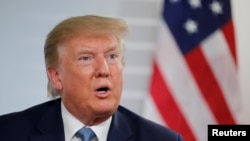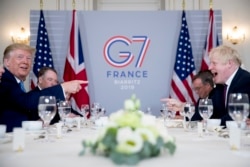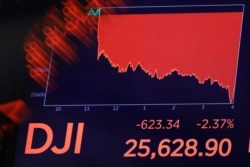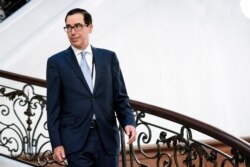U.S. President Donald Trump said Sunday he had "second thoughts" about escalating his reciprocal tariff war with China, but the White House quickly clarified that he meant that was because he did not raise the taxes even more than he did.
Last week, before heading to France for the Group of 7 summit of the leaders of some of the world's leading economies, Trump boosted tariffs on $550 billion worth of Chinese products shipped to the United States after Beijing said it would raise tariffs on $75 billion worth of U.S. exports to China, which itself was in retaliation to an earlier Trump tariff hike.
On Sunday, as he sat down to a breakfast meeting with new British Prime Minister Boris Johnson, a reporter asked Trump whether he regretted the tit-for-tat tariff war with China. Trump responded, "Yeah, sure. Why not."
"Might as well," he said. "Might as well. I have second thoughts about everything."
When asked if he would declare a national emergency to block U.S. companies from buying Chinese goods, Trump said, "I have the right to, if I want."
But Trump then claimed that trade talks were going well with China and that he planned to walk back some of his recent threats, such as seeking to force American companies to leave China.
News stories from the site of the summit in the Atlantic coastal town of Biarritz quickly interpreted Trump's "second thoughts" remark as having regrets about boosting tariffs on Chinese exports.
The international attention the remark drew came in part because Trump has been defiant in confronting China's trade practices and its wide trade surplus with the U.S., which totaled $419 billion in 2018, and partly because Trump rarely publicly regrets any pronouncement he has made.
But not long after, White House press secretary Stephanie Grisham said, "His answer has been greatly misinterpreted. President Trump responded in the affirmative -- because he regrets not raising the tariffs higher."
The U.S.-China tariff war has roiled world stock markets for weeks, with wild gyrations in market performance, depending on the tariff announcements coming out of Washington and Beijing and then regaining ground when some hopeful signs surfaced that the world's two biggest economies might yet reach a trade agreement in the coming months.
On Friday, U.S. stock indexes plummeted more than 2% after China first announced the tariff hike on the $75 billion worth of U.S. exports, followed hours later by Trump saying he would increase existing tariffs on $250 billion of Chinese goods from 25% to 30% as of Oct. 1. In addition, he said a new round of tariffs on another $300 billion in Chinese exports would be increased from 10% to 15%. The first batch of those tariffs are set to take effect next Sunday, Sept. 1.
China expecting worsening trade relations
Whatever Trump's intentions on the tariff war, China said it expects worsening economic conflict with the U.S.
Hu Xijin, editor-in-chief of the state-run People's Daily newspaper, wrote on Twitter, "Regardless of his specific expression each time, we're seriously making preparations for scenario in which China-U.S. trade relations deteriorate further, even much worse than now.
Trump was also asked whether world leaders at the summit have asked him to curb his trade war with China, and he responded, "No, not at all. I haven't heard that at all."
But Johnson nudged Trump in that direction, saying, "Just to register the faint, sheep-like note of our view on the trade war, we're in favor of trade peace on the whole, and dialing it down a beat."
U.S. Treasury Secretary Steven Mnuchin told Fox News Sunday from France, "Our first choice is to have fair and reciprocal trade with China," but said Trump "absolutely" intends to raise the tariffs on Chinese tariffs on Sept. 1.
Last week, as the tariff conflict heightened, Trump raised the question on Twitter of who was the "bigger enemy," Chinese President Xi Jinping or Jerome Powell, chairman of the Federal Reserve, the U.S. central bank, whom Trump has often attacked for not cutting the Fed's benchmark interest rate fast enough to boost the U.S. economy.
Mnuchin said Trump still considers Xi a friend on several issues, but that they are "still enemies" on trade.
As for Trump calling Powell, a Trump appointee as Fed chair, an enemy, Mnuchin said, "I don't think it was a literal comment."







